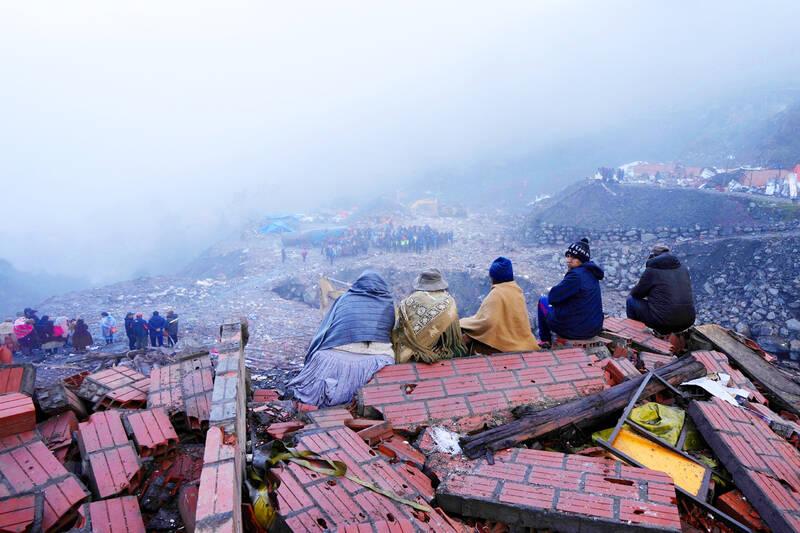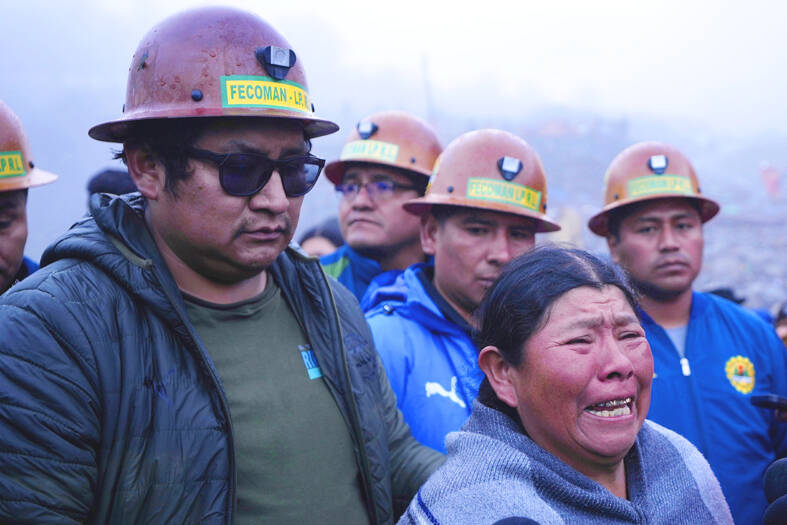An explosion killed at least five people, including a pregnant woman and a one-year-old, during a standoff between rival groups of gold miners early on Thursday in northwestern Bolivia, police said, a rare instance of a territorial dispute between the nation’s mining cooperatives turning fatal.
The blast thundered through the Yani mining camp as two rival mining groups disputed access to the gold mine near the mountain town of Sorata, about 150km northwest of the country’s administrative capital of La Paz, said Colonel Gunther Agudo, a local police officer.
Several gold deposits straddle the remote area.

Photo: AP
Agudo had initially reported six people killed, but revised the toll to five after firefighters finished recovering the bodies from under the rubble.
The dead included three men, a pregnant woman and an infant, he said.
Bolivian Deputy Minister of the Interior Jhonny Aguilera said that the suspected perpetrator of the attack was killed by the explosion, which was detonated by remote control.

Photo: AP
The predawn explosion at the mine struck a three-story house, and set cars and tractors alight. The fires wrecked several other structures and cut electricity.
Bolivia’s mining industry stands out for its huge sector of cooperatives — legal groups of artisanal miners — which drive 58 percent of mining production, the latest government data showed.
The thousands of groups also wield political clout in the resource-rich country, where they have representation in parliament.
Cooperatives emerged in Bolivia as more established mining operations dismissed legions of workers in the risky, boom-and-bust business, compelling miners to organize themselves when commodity prices slumped and lay-offs loomed.
Over the decades, cooperatives have increasingly fought over the chance to extract minerals — hurling rocks and dynamite sticks at each other and against unionized, salaried workers from Bolivia’s state-run mining company, Comibol.
Comibol came to dominate the crucial industry under former Bolivian president Evo Morales, who governed the landlocked Andean nation from 2006 to 2019 and barred foreign companies from having a controlling stake in mineral extraction.
In Thursday’s clash, the struggle for control of veins of the gold reserve between two rival cooperatives had simmered for years, said Jhony Silva, a legal adviser to one of the groups.
Gold remains one of Bolivia’s main mineral exports, with almost US$2.87 billion of the mineral shipped out of the country in 2023.

VAGUE: The criteria of the amnesty remain unclear, but it would cover political violence from 1999 to today, and those convicted of murder or drug trafficking would not qualify Venezuelan Acting President Delcy Rodriguez on Friday announced an amnesty bill that could lead to the release of hundreds of prisoners, including opposition leaders, journalists and human rights activists detained for political reasons. The measure had long been sought by the US-backed opposition. It is the latest concession Rodriguez has made since taking the reins of the country on Jan. 3 after the brazen seizure of then-Venezuelan president Nicolas Maduro. Rodriguez told a gathering of justices, magistrates, ministers, military brass and other government leaders that the ruling party-controlled Venezuelan National Assembly would take up the bill with urgency. Rodriguez also announced the shutdown

Civil society leaders and members of a left-wing coalition yesterday filed impeachment complaints against Philippine Vice President Sara Duterte, restarting a process sidelined by the Supreme Court last year. Both cases accuse Duterte of misusing public funds during her term as education secretary, while one revives allegations that she threatened to assassinate former ally Philippine President Ferdinand Marcos Jr. The filings come on the same day that a committee in the House of Representatives was to begin hearings into impeachment complaints against Marcos, accused of corruption tied to a spiraling scandal over bogus flood control projects. Under the constitution, an impeachment by the

Exiled Tibetans began a unique global election yesterday for a government representing a homeland many have never seen, as part of a democratic exercise voters say carries great weight. From red-robed Buddhist monks in the snowy Himalayas, to political exiles in megacities across South Asia, to refugees in Australia, Europe and North America, voting takes place in 27 countries — but not China. “Elections ... show that the struggle for Tibet’s freedom and independence continues from generation to generation,” said candidate Gyaltsen Chokye, 33, who is based in the Indian hill-town of Dharamsala, headquarters of the government-in-exile, the Central Tibetan Administration (CTA). It

China executed 11 people linked to Myanmar criminal gangs, including “key members” of telecom scam operations, state media reported yesterday, as Beijing toughens its response to the sprawling, transnational industry. Fraud compounds where scammers lure Internet users into fake romantic relationships and cryptocurrency investments have flourished across Southeast Asia, including in Myanmar. Initially largely targeting Chinese speakers, the criminal groups behind the compounds have expanded operations into multiple languages to steal from victims around the world. Those conducting the scams are sometimes willing con artists, and other times trafficked foreign nationals forced to work. In the past few years, Beijing has stepped up cooperation